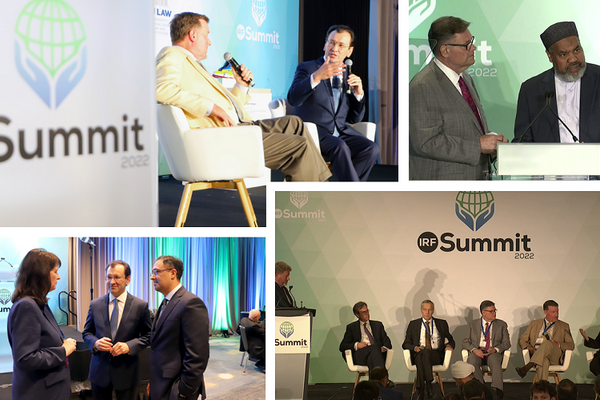
Uzbekistan represented at the summit on international religious freedom
Tashkent, Uzbekistan (UzDaily.com) -- Ambassador of Uzbekistan Javlon Vakhabov took part in the International Religious Freedom Summit (IRF Summit), initiated by former Ambassador-at-Large for Religious Freedom Sam Brownback, Dunyo news agency reported.
The event was also attended by members of the Joe Biden administration, Speaker of the House of Representatives Nancy Pelosi, former Secretary of State Michael Pompeo, senators and congressmen, representatives of the US Commission on International Religious Freedom, parliamentarians from Great Britain, Finland and Poland, diplomats, professional athletes, heads of international non-governmental organizations and world religious leaders.
The conference discussed topics such as combating persecution and religious discrimination, countering genocide based on religious ethnicity, social networks and their role in promoting religious freedom, religious freedom in the economy and in the context of national security, promoting religious freedom and women's rights among Muslims , the impact of military conflicts on freedom of religion and others.
During the dialogue held in the format of an interview, Ambassador Javlon Vakhabov and the honorary president of the Institute for Global Engagement Chris Seiple, the participants were informed in detail about the progress of Uzbekistan in the field of ensuring freedom of religion, liberalizing legislation on religious organizations, promoting the ideas of enlightened Islam and countering radicalism among young people, as well as international Republican initiatives in these areas. The significance of the UN resolution “Enlightenment and Religious Tolerance” initiated by Uzbekistan, as well as the international forum “Dialogue of Declarations” held in Tashkent and Bukhara and the Bukhara Declaration adopted as a result of it, promoting the ideas of education, culture of tolerance, respect for national traditions of adherents of various faiths and ensuring their rights.
According to the Embassy, the essence and main goals of constitutional reforms in Uzbekistan, as well as its significance for further promotion of the fundamental rights of citizens, including freedom of religion, are explained separately.
Former Chairman of the US Commission on International Religious Freedom (USCIRF) Nadine Maenza, in her speech, noted the successful experience of Uzbekistan in promoting religious freedoms. “We are seeing how, in a relatively short period of time, Uzbekistan has made great progress in ensuring religious freedoms, presenting to the world a unique model for promoting interfaith harmony, she stressed. “All this is the result of strategic initiatives and ambitious transformations that many people with different skills and experience must support.”
In turn, Vice President of the Global Engagement Institute, James Chen, who spoke at the summit, said that “in Uzbekistan, we managed to build a multifaceted partnership with the government, civil society institutions and representatives of religious communities to strengthen an effective infrastructure for ensuring religious freedom.”
The country has made unprecedented progress in recent years, and through training programs on the rule of law and religious freedoms, as well as interfaith dialogue among representatives of the Abrahamic religions, we are helping to consolidate and multiply the results achieved,” said James Chen.
During a panel discussion on the achievements of the world in promoting religious freedom, the imam of one of the largest mosques in the United States, Mohammed Majid, noted: “During trips to other countries, we found that when people spend time together and talk about who they are, talk about their families, about their communities - delusions and misunderstandings completely disappear. We have seen a vivid expression of open and trusting relations between people of different faiths, religions and beliefs in Uzbekistan.”
In addition, a short video (Making Multi-Faith History in Bukhara) prepared by the Institute for Global Engagement following a visit to Uzbekistan to participate in the “Declaration Dialogue” forum was demonstrated as part of the event, which revealed our country’s approaches to promoting religious pluralism and tolerance. “Uzbekistan is experiencing a renaissance, bringing new content to open dialogue and transformations that signal a new era of friendship, respect and trust,” the story emphasizes.
In it, the head of the Global Engagement Institute, Chris Seiple, notes that “The Declaration Dialogue is a new mechanism that brings together representatives of previous declarations in a country with a Muslim majority and serves as the basis for an open and constructive dialogue that has allowed us to overcome deep differences and create cohesive societies.”
“In the United States, over the past 5 or 6 years, we have seen the government of Uzbekistan ready to discuss any issue, even those that are considered sensitive here, and we see great positive progress in ensuring religious freedom,” said US Ambassador to Tashkent Daniel Rosenblum.
The Bukhara Declaration is already bearing fruit, helping to strengthen ties between religious leaders around the world - from Ghana to Indonesia. This is a compelling testament to the power of partnership and practical solutions to drive global action and meaningful change that allows the Bukhara Declaration Dialogue to transcend one region or one religion,” the special video notes.
The IRF Summit is an international forum held annually in Washington since 2021 at the initiative of the former US Ambassador-at-Large for Religious Freedom Sam Brownback. The forum brings together government representatives, faith leaders and civil society activists from more than 80 countries. The forum discusses issues of promoting religious freedoms around the world, counteracting polarization and radicalization in society, approaches to protect believers who are persecuted individually or collectively.